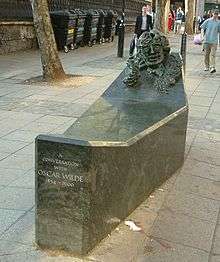A Conversation with Oscar Wilde
 The memorial in 2004 | |
| Coordinates | 51°30′31.27″N 0°7′33.22″W / 51.5086861°N 0.1258944°W |
|---|---|
| Location | Adelaide Street, London, United Kingdom |
| Designer | Maggi Hambling |
| Type | Sculpture |
| Material | Bronze, granite |
| Dedicated to | Oscar Wilde |
A Conversation with Oscar Wilde is an outdoor sculpture and the first public monument to Oscar Wilde, located in London, United Kingdom. The memorial was first suggested during the 1980s and early 1990s by fans of his work, including Derek Jarman. Following Jarman's death in 1994, a committee called "A Statue for Oscar Wilde" was formed to bring a tribute to fruition. The committee included the actors Dame Judi Dench and Sir Ian McKellen, and the poet Seamus Heaney.[1] From sketches submitted by twelve artists, six were chosen to create models of their concepts. Maggi Hambling's "witty and amusing" work was chosen for the memorial. It features Wilde's bronze head rising from a green granite sarcophagus which also serves as a bench. Wilde is also depicted holding a cigarette. The work is inscribed with a quotation from his play Lady Windermere's Fan: "We are all in the gutter but some of us are looking at the stars". Hundreds of individual donors and foundations contributed funds for the project.[1] The project leader, Jeremy Isaacs, said:
I believe that the unveiling of this statue sees a great day for the theatre, for London, for Ireland, for Oscar Wilde's family and for all those people who admire both the man and his work. I and all my colleagues who have worked on the project hope that Maggi Hambling's A Conversation with Oscar Wilde will give pleasure to London and all its visitors for many, many years to come.[1]
References
- 1 2 3 "London's Wilde tribute". BBC. November 30, 1998. Retrieved September 18, 2014.
External links
- Oscar Wilde – Adelaide Street, London, UK at Waymarking.com
- Statue: Oscar Wilde reclining at LondonRemembers.com
- Maggi Hambling's sculptures I'd love to smash by Charles Spencer (September 22, 2009), The Telegraph